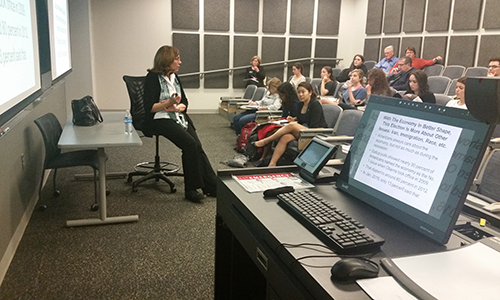The craft of business reporting has evolved over the last three decades, but the challenge of telling compelling stories has remained constant, according to industry lecturers speaking at the University of Georgia.
“At the beginning of my career, the primary role of a business reporter was to help solve the scarcity of information,” said veteran business journalist Marilyn Geewax. “Now, the primary role is to sort through and make sense of the tidal wave of information that is available to our audience.”
Business journalists can change the world
Geewax, a senior business editor for NPR, was one of several invited speakers who discussed the art and craft of business journalism with students in a special topics course on the subject at the Grady College of Journalism and Mass Communication. The spring course and lecture series were funded by a grant from the Reynolds National Center for Business Journalism.
The speakers said an interpretive approach is essential if business journalism is to remain relevant to large audiences in an era of social and mobile media and shortened attention spans.
“Business journalists can change the world with our work,” Geewax said, provided the work is compelling. “I focus on taking data, making it relevant and telling stories that people can understand. We all need good storytellers,” she said.
Mark Garrison, a reporter with Marketplace, said business journalists must be willing to “go into the weeds” to understand complex issues thoroughly so that explaining the story becomes second nature. “I’ll go into the weeds as a reporter, but I have to get out of the weeds to take it to the audience,” he said.
Look beyond experts
Garrison encouraged business reporters to look beyond experts in industry and academia “to find real people who can bring stories about research or statistics to life.” He used the example of interviewing a small business owner about hiring plans when recently reporting on the unemployment rate.
“You can find the real people behind the statistics,” Garrison said.
Mandi Woodruff, a personal finance journalist, endorsed using real examples from real people, but said some stories are difficult to source. “Finding sources is probably one of the hardest parts of my job,” she said, calling personal finance “a very delicate beat” because many people are not willing to open up and talk publicly about their money. “It’s finding Sarah Joe from Montana who can’t pay for her mortgage that can be challenging,” said Woodruff, who worked at Yahoo! Finance at the time of her remarks, but recently became executive editor for Magnify Money.
Woodruff said she relies on social media to develop story sources. “I’m constantly talking with friends about potential stories on Facebook and post all of my stories so they can see, and maybe feel comfortable about sharing a similar financial story,” said Woodruff. After finding the right example, Woodruff said she often has to make a personal appeal. “If you explain how this story is going to help the greater good, people are more inclined to open up to you,” she said.
Polina Marinova, a deputy editor with Fortune Venture, reiterated the importance of social media in developing contacts and sources. Marinova suggested reporters make a list of Twitter influencers in the topics they cover and reach out to them. “You’d be surprised how many people will talk to you,” she said.
Good analytical (and writing) skills are key
Although reporting is central to the process, Joanna Ossinger, an editor with Bloomberg, told the students that what happens after the reporting is done separates good business journalists from great ones. She said business journalism needs reporters who can interpret and explain what they learn from their reporting. “Good analytical skills are key,” said Ossinger, whose term as president of the Society of American Business Editors and Writers ended in May.
Garrison also noted the importance of word choice and clarity to good business writing given that topics are often alien to the audience. Without regard to medium, Garrison emphasized how good writing is essential to telling compelling stories, and he explained his meticulous approach.
“Some reporters think in terms of word count, but I think in terms of syllable count,” he said. “If I can replace a four-syllable word with a two-syllable word, the story becomes more concise. But perhaps, I’ve made room for another adjective that will make the story more interesting.”
Use numbers carefully
Garrison also said business journalists need to take special care when reporting on numbers and statistics, which are often central to business stories. Numbers are difficult, he said, because people do not process them as quickly as they do words.
“You have to choose very carefully which numbers and where you want to place the data so that your audience can really grasp it,” Garrison said. “Make sure to round up. You want to make it as digestible as possible for the reader or listener.”
The speakers acknowledged that many aspiring journalists shy away from pursuing careers in business journalism because of a misconception that such reporting requires extensive math skills. They debunked that myth and encouraged the students to see business reporting as a different path for telling relevant and important stories.
“I get the opportunity to tell human stories about overcoming personal struggles,” Woodruff said of her personal finance beat. Garrison said he seeks out assignments that take him to “surprising” places. “I like covering things people wouldn’t normally see unfold,” he said.
Geewax reiterated that complex math skills are not essential. “You don’t need to be good at arithmetic to be a good business journalist,” she concluded. “You do, however, need to be curious.”











